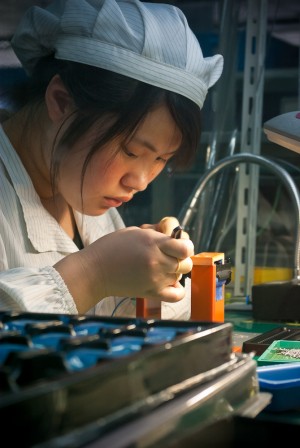
Apple announced its decision to begin working with the FLA in January when it released its supplier responsibility report for 2011. At that time, controversy over Apple's and Foxconn's labor practices had flared up again thanks to a smattering of high-profile media coverage. The first was Mike Daisey's now-tweaked one-man show, which painted Foxconn's workers in China as being unhappy and unsafe—which was later made even more popular by radio show This American Life. Those were closely followed by a scathing New York Times report that asserted Apple's willingness to look the other way when it comes to unsafe working conditions.
All those elements combined sparked Apple CEO Tim Cook to send an internal e-mail to employees saying that such accusations were "patently false and offensive." He went on to point out that Apple conducts its own audits of its manufacturing partners every year, and that Apple's employees overseas know the real deal. "As we reported earlier this month, we’ve made a great deal of progress and improved conditions for hundreds of thousands of workers. We know of no one in our industry doing as much as we are, in as many places, touching as many people," Cook wrote.
The FLA inspections moved forward in February, and one month later the FLA concluded that Apple and Foxconn were indeed in violation of some labor and safety rules. For example, factory employees exceeded the Chinese legal limits of 49 hours per week and 36 hours overtime per month in all three of Foxconn's factories—in fact, the FLA's more lenient standard of 60 hours per week (regular plus overtime pay) were also exceeded in all three factories. The FLA also took issue with the way that employees were paid overtime, and found that 43 percent of Foxconn workers had experienced or witnessed an accident.
As such, the FLA issued 360 "action items" for the companies to take, with deadlines going as far out as July of 2013. And in Tuesday's report, the FLA confirmed that Apple and Foxconn had already met close to 79 percent of them, including numerous changes to physical working conditions, as well as health and safety training for employees. According to the report, the companies also worked to extend unemployment insurance coverage to migrant workers in Shenzen, and made vast improvements to Foxconn's internship program.
"Our verification shows that the necessary changes, including immediate health and safety measures, have been made. We are satisfied that Apple has done its due diligence thus far to hold Foxconn accountable for complying with the action plan, including the commitment to reform its internship program," FLA CEO Auret van Heerden said in a statement. "When we finished our initial investigation in March, Foxconn promised to address concerns with its internship program by ensuring that student interns do not work overtime, their work has a more direct connection to their field of study, and they understand that they are free to terminate the internship if and when they wish."
But even the FLA acknowledges that some of the biggest challenges are yet to come. Foxconn and Apple committed to make improvements when it comes to union elections and worker representation, for example. They also committed to follow Chinese labor law on hours of work, though the FLA says some improvements have already been made. "The company has reduced hours to 60 per week (including overtime) with the goal of reaching full compliance with the Chinese legal limit of 40 hours per week plus an average of 9 hours of overtime per week while protecting worker pay," reads the FLA report.
Ironically, the working hours reduction has caused some stress among the employees who work at Foxconn's factories—these workers have often traveled across the country in order to support their families, so the prospect of having less work (and therefore, less pay) available to them is frustrating and confusing.
"The next phase of improvements will be challenging for Foxconn because they involve major changes in the working environment that will inevitably cause uncertainty and anxiety among workers," van Heerden said. "As Foxconn prepares to comply with the Chinese legal limits on work hours, consultation with workers on the changes and implications will be critical to a successful transition."
Listing image by Robert S. Donovan
reader comments
46